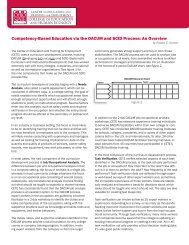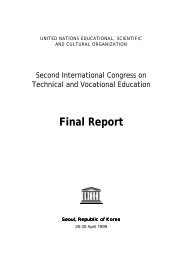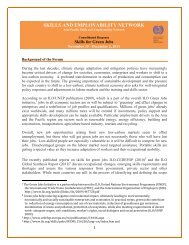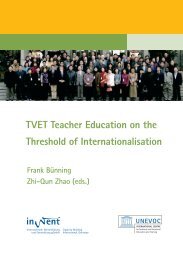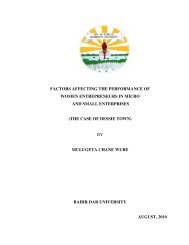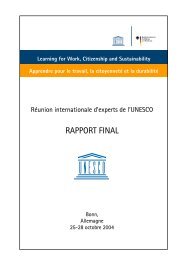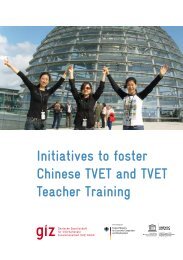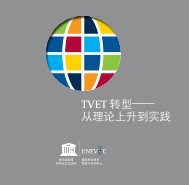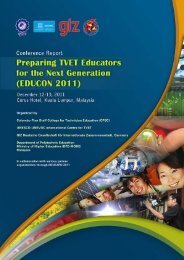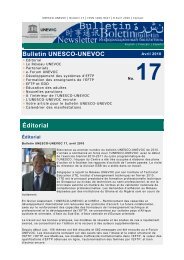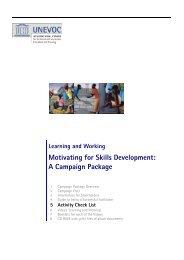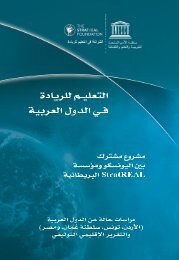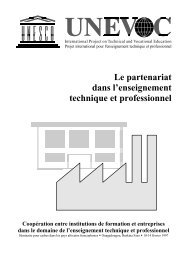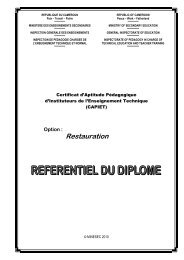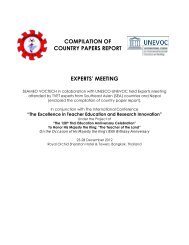Green TVET and Education for Sustainable ... - Unesco-Unevoc
Green TVET and Education for Sustainable ... - Unesco-Unevoc
Green TVET and Education for Sustainable ... - Unesco-Unevoc
Create successful ePaper yourself
Turn your PDF publications into a flip-book with our unique Google optimized e-Paper software.
TABLE OF CONTENTS<br />
Introduction .................................................................................. 5<br />
Program Objectives ...................................................................... 6<br />
The Organizers ............................................................................. 7<br />
Meeting Presentors <strong>and</strong> Facilitators ............................................. 8<br />
Workshop Session 1:<br />
World Trends on <strong>Education</strong> <strong>for</strong> <strong>Sustainable</strong> Development<br />
<strong>and</strong> its Implications in <strong>TVET</strong> ....................................................... 10<br />
Workshop Session 2 & 3:<br />
Country Perspectives on <strong>Green</strong>ing <strong>TVET</strong><br />
in support of DESD ...................................................................... 12<br />
Workshop Session 4:<br />
<strong>TVET</strong> <strong>for</strong> Water Sustainability, Global <strong>and</strong><br />
Regional Network <strong>and</strong> Actions .................................................... 15<br />
International Experts’ Meeting on <strong>TVET</strong> <strong>and</strong> ESD:<br />
Approaches <strong>and</strong> Implementation Schemes<br />
in Theory <strong>and</strong> Practice ................................................................. 17<br />
Programme ................................................................................... 20<br />
Participants Directory (Annex A) ................................................ 22
International Experts’ Workshop on<br />
<strong>Green</strong> <strong>TVET</strong> <strong>and</strong> <strong>Education</strong> <strong>for</strong> <strong>Sustainable</strong> Development<br />
Capacity Development Needs <strong>for</strong> Water <strong>Education</strong><br />
Munich/Magdeburg, Germany<br />
September 13-17, 2010
INTRODUCTION<br />
Among the greatest challenges we face in the world<br />
today are those of delivering, growing or securing<br />
aordable natural resources including water <strong>for</strong> every<br />
citizen. Achieving sustainable development requires<br />
a global change of mindset <strong>and</strong> behaviors. Indeed,<br />
it has long been recognized that education is crucial<br />
<strong>for</strong> achieving sustainable development. e UN<br />
Conference on the Human Environment (‘Stockholm<br />
Conference’) in 1972 emphasized education as a way<br />
of addressing human-environment problems. Agenda<br />
21, the document adopted at the UN Conference<br />
on Environment <strong>and</strong> Development (UNCED, ‘Rio<br />
Summit’, Rio de Janeiro, 1992), likewise emphasized<br />
the need to promote education, public awareness <strong>and</strong><br />
training in order to assist bringing about sustainable<br />
development. In particular, Chapter 36 on promoting<br />
education, public awareness <strong>and</strong> training states that,<br />
“<strong>Education</strong> <strong>and</strong> Training are vital <strong>for</strong> promoting<br />
sustainable development <strong>and</strong> improving the<br />
capacity of the people to address environment <strong>and</strong><br />
development issues.”<br />
e Bonn Declaration (2004) in particular, gave<br />
special emphasis to the signicance of education <strong>for</strong><br />
the global development agenda <strong>and</strong> underlines the<br />
essential contribution of <strong>Education</strong> <strong>for</strong> <strong>Sustainable</strong><br />
Development (ESD) to shaping the purpose, content<br />
<strong>and</strong> quality of all educations including <strong>TVET</strong>.<br />
e Bonn Declaration on Learning <strong>for</strong> Work, Citizenship<br />
<strong>and</strong> Sustainability, argued that:<br />
. . . since education is considered the key to eective<br />
development strategies, technical <strong>and</strong> vocational<br />
education <strong>and</strong> training (<strong>TVET</strong>) must be the master key<br />
that can alleviate poverty, promote peace, conserve the<br />
environment, improve the quality of life <strong>for</strong> all <strong>and</strong> help<br />
achieve sustainable development.<br />
<strong>Education</strong> <strong>for</strong> <strong>Sustainable</strong> Development (ESD) can<br />
contribute substantially to address key sustainable<br />
development challenges. Indeed, without reorienting<br />
education, successfully confronting issues like water<br />
<strong>and</strong> climate change, among many others, will not be<br />
possible. In this light, it is becoming the central agenda<br />
in various major education <strong>and</strong> development <strong>for</strong>ums<br />
such as international conferences <strong>and</strong> negotiations<br />
including the G8, G20, Copenhagen Climate<br />
Change Conference (2009), EFA High-Level Group,<br />
UN Chief Executives Board <strong>and</strong> UNESCO World<br />
Conferences among many other ongoing events <strong>and</strong><br />
activities.<br />
e United Nations System sees an alternative future<br />
out of the crisis in terms of “<strong>Green</strong> Economy.” e<br />
Inter-agency statement of 25 June 2009 on <strong>Green</strong><br />
Economy:<br />
A trans<strong>for</strong>mation to address multiple cries clearly states,<br />
“e shi towards a green economy requires education<br />
<strong>for</strong> sustainable development”. Indeed, building green<br />
economies <strong>and</strong> sustainable societies requires more than<br />
clean technologies. Humankind will not solve the problems<br />
it faces today with the same values <strong>and</strong> approaches that<br />
created them.<br />
Hence, the international community needs to<br />
underst<strong>and</strong> green economies as sustainable societies,<br />
creating a balance between environmental, societal,<br />
cultural <strong>and</strong> economic considerations in the pursuit<br />
of enhanced quality of life. e educational process<br />
can facilitate an encouraging environment that in turn<br />
provide people with the chance to apply sustainable<br />
development principles <strong>and</strong> to beer underst<strong>and</strong><br />
the multiple potential impacts of their actions <strong>and</strong><br />
behaviors.<br />
Further, water is an essential <strong>and</strong> cross-cuing<br />
theme <strong>for</strong> ESD being a foundation of economy,<br />
society <strong>and</strong> the environment. It is thus reected as<br />
a priority by the UNESCO Member States among<br />
other emerging <strong>and</strong> recurrent issues. As concluded<br />
in the UN World Water Development Reports,<br />
the looming water crisis, more than a result of the<br />
availability of the resource, is a result of existing water<br />
governance approaches. <strong>Education</strong> at all levels <strong>and</strong> of<br />
all stakeholders has a decisive role to play in water<br />
governance <strong>and</strong> in integrated water management.<br />
<strong>Education</strong>al programmes requiring specic action<br />
needs to be developed in order to learn from each<br />
other’s experiences.<br />
It is increasingly acknowledged that sustainable<br />
solutions <strong>for</strong> water challenges strongly depend<br />
on the availability of adequately trained human<br />
resources, from high-level experts to communities<br />
<strong>and</strong> stakeholders. <strong>TVET</strong> needs to undertake action<br />
to create more exchange <strong>and</strong> knowledge plat<strong>for</strong>m <strong>for</strong><br />
International Experts Workshop on<br />
<strong>Green</strong> <strong>TVET</strong> <strong>and</strong> <strong>Education</strong> <strong>for</strong> <strong>Sustainable</strong> Development: Capacity Development Needs <strong>for</strong> Water <strong>Education</strong><br />
September 13-17, 2010 | Munich, Germany<br />
| 5
water <strong>and</strong> education professionals <strong>and</strong> to develop<br />
needs assessments <strong>for</strong> capacity development, e.g.<br />
to set priorities, <strong>and</strong> establish pilot projects <strong>and</strong><br />
programs to implement capacity development.<br />
However, <strong>TVET</strong> in many countries remains a<br />
mere supplier of skilled labor to industry <strong>and</strong> is<br />
thereby unable to respond eectively to the needs<br />
of the sustainable development strategies. e<br />
complexity, breadth <strong>and</strong> diversity of <strong>Green</strong> <strong>TVET</strong><br />
<strong>and</strong> Water <strong>Education</strong> in pursuit of ESD require that<br />
a wide range of stakeholders ought to become active<br />
<strong>and</strong> cohesive to implement the DESD through a<br />
partnership approach: governments, parliaments,<br />
non-governmental organizations, media, the private<br />
sector, education institutions, research institutes,<br />
individual educators <strong>and</strong> students, among others. In<br />
view of these, boom-up <strong>and</strong> top-down strategies<br />
essential be combined.<br />
As a result, the joint ILO <strong>and</strong> UNESCO<br />
Recommendations on <strong>TVET</strong> <strong>for</strong> the 21st Century<br />
stated that, as “a vital aspect of the educational process<br />
in all countries” <strong>TVET</strong> should:<br />
a. Contribute to the achievement of the societal<br />
goals of greater democratization <strong>and</strong> social,<br />
cultural <strong>and</strong> economic development, while<br />
at the same time developing the potential<br />
of all individuals,both men <strong>and</strong> women, <strong>for</strong><br />
active participation in the establishment <strong>and</strong><br />
implementation of these goals, regardless of<br />
religion, race <strong>and</strong> age;<br />
b. Lead to an underst<strong>and</strong>ing of the scientic<br />
<strong>and</strong> technological aspects of contemporary<br />
civilization in sucha way that people<br />
comprehend their environment <strong>and</strong> are capable<br />
of acting upon it while taking a critical view<br />
of the social, political <strong>and</strong> environmental<br />
implications of scientic <strong>and</strong> technological<br />
change;<br />
c. Empower people to contribute to<br />
environmentally sound sustainable<br />
development through their occupations <strong>and</strong><br />
other areas of their lives.<br />
6 |<br />
International Experts Workshop on<br />
<strong>Green</strong> <strong>TVET</strong> <strong>and</strong> <strong>Education</strong> <strong>for</strong> <strong>Sustainable</strong> Development: Capacity Development Needs <strong>for</strong> Water <strong>Education</strong><br />
September 13-17, 2010 | Munich, Germany<br />
In this framework, <strong>TVET</strong> ought to open a window<br />
to the world <strong>and</strong> vice versa. For example, <strong>TVET</strong><br />
institutions ought to explore <strong>and</strong> exchange<br />
in<strong>for</strong>mation about innovative teaching <strong>and</strong> learning<br />
methods, such as programs on clean energy, clean<br />
water <strong>and</strong> clean technology, reorientation of <strong>TVET</strong><br />
curricula, sustainable campus management programs<br />
<strong>and</strong> examples of innovative approaches to integrating<br />
learning in <strong>TVET</strong> with on-the-job training <strong>and</strong><br />
oering community based services aimed at positive<br />
societal responses to bring the relevance <strong>and</strong> emphasis<br />
<strong>for</strong> a sustainable future.<br />
Building upon these past <strong>and</strong> ongoing key initiatives,<br />
the 2010 International Experts Meeting on <strong>Green</strong><br />
<strong>TVET</strong> <strong>and</strong> <strong>Education</strong> <strong>for</strong> <strong>Sustainable</strong> Development:<br />
Capacity Development Needs <strong>for</strong> Water <strong>Education</strong><br />
was pursued to clarify the implications of such issues<br />
<strong>for</strong> <strong>TVET</strong>. e sharing of experiences in responding<br />
to such issues are used to identify lessons of leading<br />
practice, catalyze networks, <strong>and</strong> making plans <strong>for</strong><br />
the enhancing the contributions of <strong>TVET</strong> to the<br />
changing world of work.<br />
PROGM AIMS & OBJECTIVES<br />
e International Experts workshop session aimed to<br />
contribute to <strong>Green</strong>ing <strong>TVET</strong> in support of DESD<br />
<strong>and</strong> the role of <strong>TVET</strong> <strong>for</strong> Water Sustainability within<br />
the context of the changing nature of industry <strong>and</strong><br />
work, the pressures of global nancial crisis <strong>and</strong> the<br />
limits <strong>and</strong> opportunities posed by climate change <strong>and</strong><br />
other environmental imperatives. ese changing<br />
circumstances created opportunities <strong>for</strong> <strong>TVET</strong> to<br />
contribute not only to enhanced productivity but<br />
also to social development, environmental protection<br />
<strong>and</strong> citizenship.<br />
e meeting provided opportunities <strong>for</strong> participants<br />
to identify drivers of change in the workplace <strong>and</strong><br />
the implication of these <strong>for</strong> policy <strong>and</strong> innovative<br />
practice in <strong>TVET</strong> in support of DESD. e program<br />
focused on the implications on the following <strong>TVET</strong><br />
related emerging issues on:<br />
<strong>Green</strong>ing <strong>TVET</strong> in Support of DESD<br />
<strong>TVET</strong> <strong>for</strong> Water Sustainability & Governance
e program also:<br />
reviewed current trends <strong>and</strong> international<br />
discourse <strong>for</strong> <strong>TVET</strong> <strong>and</strong> Water <strong>Education</strong>;<br />
comprehended country perspective of best<br />
practices in reorienting towards <strong>Green</strong> <strong>TVET</strong> in<br />
support of DESD;<br />
assimilated innovative <strong>and</strong> applied technologies<br />
in water sector <strong>for</strong> <strong>TVET</strong>;<br />
<strong>for</strong>mulated policy directives <strong>and</strong> strategies <strong>for</strong><br />
building capacity in reorienting towards <strong>Green</strong><br />
<strong>TVET</strong> <strong>and</strong> Water <strong>Education</strong> in pursuit of ESD.<br />
is workshop facilitated to foster South-South <strong>and</strong><br />
North-South technical cooperation through national,<br />
regional <strong>and</strong> international collaboration by the<br />
implementation of training programs <strong>and</strong> projects.<br />
PARTICIPANTS<br />
e international experts’ workshop was well<br />
aended by representatives <strong>and</strong> international experts<br />
from Asia-Pacic region, representing national policy<br />
makers, curriculum planners <strong>and</strong> teacher educators,<br />
<strong>TVET</strong> institutions <strong>and</strong> their managers, teachers,<br />
industry leaders, as well as the UNEVOC Network<br />
members in Africa. is wide scope of participants<br />
invited by UNESCO-UNEVOC, InWEnt <strong>and</strong> CPSC,<br />
DWA was to ensure that the “<strong>Green</strong> <strong>TVET</strong> <strong>for</strong> Water<br />
Sustainability” becomes a key part of the agenda to<br />
in line with the UNESCO Strategy <strong>for</strong> the Second<br />
Half of the United Nations Decade of <strong>Education</strong> <strong>for</strong><br />
<strong>Sustainable</strong> Development (Please see Annex A <strong>for</strong> a<br />
full list of the Participants)<br />
ADMINISTTIVE ARNGEMENTS<br />
e responsibility <strong>for</strong> organizing this meeting<br />
was shared between the UNESCO-UNEVOC<br />
International Centre (Bonn, Germany), InWEnt<br />
(Magdeburg, Germany), CPSC (Manila,<br />
Philippines), <strong>and</strong> DWA -the German Association<br />
<strong>for</strong> Water, Wastewater <strong>and</strong> Waste, (Germany) <strong>and</strong><br />
in collaboration with UNESCO-IHP International<br />
Hydrological Programme (Paris, France). In a good<br />
opportunity to avail of an enriching <strong>and</strong> enabling<br />
environment to achieve new perspectives in <strong>TVET</strong><br />
<strong>for</strong> Water Sustainability, the workshop was organized<br />
on conjunction with the 2010 International Trade<br />
Fair <strong>for</strong> Water (IFAT) in Munich.<br />
ORGANIZERS<br />
DR. SHYAMAL MAJUMDAR is the<br />
Director General of Colombo Plan<br />
Sta College <strong>for</strong> Technician <strong>Education</strong><br />
(CPSC). He earned his Bachelor’s Degree<br />
in Electronics <strong>and</strong> Communication<br />
Engineering, Master’s Degree in<br />
Telecommunications Engineering <strong>and</strong> Doctorate Degree<br />
in Computer Science <strong>and</strong> Engineering. Prior to coming<br />
to CPSC, he was Professor <strong>and</strong> Head of the Department<br />
of Computer Science <strong>and</strong> Engineering at the National<br />
Institute of Technical Teachers Training <strong>and</strong> Research<br />
(NITR) in Kolkata, India. Dr. Majumdar has demonstrated<br />
interests, leadership <strong>and</strong> professional expertise in<br />
technical teacher training, ICT, web-based instruction,<br />
planning <strong>and</strong> management of <strong>TVET</strong> systems, knowledge<br />
management <strong>and</strong> quality management systems. Among<br />
his many international work <strong>and</strong> exposures were his involvement<br />
in various projects in Technical <strong>and</strong> Vocational<br />
<strong>Education</strong> <strong>and</strong> Training (<strong>TVET</strong>) through his close association<br />
with CPSC, UNESCO-Bangkok, UNESCO-China,<br />
UNESCO-Cairo, FAO-UN, ADB <strong>and</strong> ADBI. He was<br />
an international expert in Open <strong>and</strong> Distance Learning,<br />
Teachers Training, Multimedia <strong>and</strong> <strong>Education</strong>al Computing<br />
<strong>for</strong> UNESCO, UNEVOC, GTZ, CPSC, COL, ADB<br />
<strong>and</strong> FAO-UN. He was involved as expert <strong>and</strong> as Editor of<br />
the Regional Guidelines <strong>for</strong> Pedagogy-Technology Integration<br />
<strong>for</strong> the Asia <strong>and</strong> the Pacic region supported by<br />
the JFIT <strong>and</strong> UNESCO. He served as Vice President of<br />
IVETA <strong>for</strong> Asia Pacic from 2002-2006 <strong>and</strong> Governing<br />
Board-engaged Faculty of CPSC.<br />
International Experts Workshop on<br />
<strong>Green</strong> <strong>TVET</strong> <strong>and</strong> <strong>Education</strong> <strong>for</strong> <strong>Sustainable</strong> Development: Capacity Development Needs <strong>for</strong> Water <strong>Education</strong><br />
September 13-17, 2010 | Munich, Germany<br />
| 7
DR. HARRY STOLTE is currently the<br />
Head of Division - Modern Media <strong>and</strong><br />
Development of Vocational Training<br />
Curricula at InWEnt, Capacity Building<br />
International in Germany, a non-prot<br />
organization with worldwide operations<br />
dedicated to human resource development, advanced<br />
training <strong>and</strong> dialogue. He obtained his Doctoral Degree<br />
in Technical Vocational <strong>Education</strong> <strong>and</strong> Training in 1984.<br />
He graduated with a University Diploma in the eld of<br />
Didactics of Technical <strong>and</strong> Vocational <strong>Education</strong> in 1981.<br />
He has been working in the eld of <strong>TVET</strong> <strong>for</strong> 20 years<br />
now in cooperation with developing countries, countries<br />
in transition, <strong>and</strong> industrialized countries such as those in<br />
South East Asia <strong>and</strong> Eastern Europe. During the early years<br />
in his career, he was engaged as a part time professor <strong>for</strong><br />
four (4) years at the University of Hamburg <strong>and</strong> University<br />
of M<strong>and</strong>eburg. Dr. Stolte also h<strong>and</strong>led managerial <strong>and</strong><br />
administrative tasks as the Head of Division of dierent<br />
institutions. His line of work is on <strong>TVET</strong> as Curriculum<br />
Development, Development of Teaching <strong>and</strong> Learning<br />
Media, as well as <strong>TVET</strong> Teacher Training. He was also<br />
into design, <strong>for</strong>mulation, implementation, <strong>and</strong> evaluation<br />
of international projects. Dr. Stolte is very familiar with<br />
projects funded both by the German government <strong>and</strong><br />
other sources of funding such as fund raising <strong>and</strong> resource<br />
mobilization activities. He also led his institution to have<br />
partnership <strong>and</strong> collaboration with international <strong>and</strong><br />
regional organization such as ILO <strong>and</strong> UNESCO.<br />
DR. L. EFISON MUNJAGANJA is<br />
the Ocer-in-charge of UNEVOC<br />
Networks, UNESCO-UNEVOC<br />
International Centre <strong>for</strong> <strong>TVET</strong>. He<br />
earned his Doctor of <strong>Education</strong> (Ed. D)<br />
<strong>and</strong> Master of Arts in <strong>Education</strong> (MA<br />
Ed) from the University of Georgia.<br />
He completed a course in the Mediterranean Institute<br />
of Management onManpower Development in Nicosia,<br />
Cyprus <strong>and</strong> the Kennedy School of Government, Harvard<br />
University, USA. He worked as Programme Specialist in<br />
TVE & Head of UNEVOC Networks. He has organised<br />
<strong>and</strong> conducted numerous seminars <strong>and</strong> workshops in<br />
the area of <strong>Education</strong> <strong>and</strong> <strong>TVET</strong> in Africa, Asia-Pacic<br />
Region <strong>and</strong> Eastern Europe. Dr. Munjaganja has actively<br />
participated as speaker, moderator, rapporteur <strong>and</strong><br />
chairperson at various international <strong>for</strong>ums in particular<br />
the ILO African Region Conference, ILO Conferences,<br />
SADC Regional Training Council meetings, UNESCO<br />
General Conferences, UNESCO Asia-Pacic Regional<br />
Conferences, UNESCO Second International Congress<br />
on TVE; <strong>and</strong> UNESCO International Experts Meeting:<br />
Follow-up to the Second International Congress on TVE.<br />
8 |<br />
WORKSHOP PRESENTORS<br />
AND FACILITATORS<br />
International Experts Workshop on<br />
<strong>Green</strong> <strong>TVET</strong> <strong>and</strong> <strong>Education</strong> <strong>for</strong> <strong>Sustainable</strong> Development: Capacity Development Needs <strong>for</strong> Water <strong>Education</strong><br />
September 13-17, 2010 | Munich, Germany<br />
Prof. Shyamal Majumdar, Ph.D<br />
Director General<br />
Colombo Plan Sta College <strong>for</strong><br />
Technician <strong>Education</strong><br />
Prof. Rajesh Khambayat, Ph.D.<br />
Chairperson, Training <strong>and</strong> Development<br />
Division, Colombo<br />
Plan Sta College <strong>for</strong> Technician<br />
<strong>Education</strong><br />
Dr. Harry Stolte<br />
Head of Division<br />
InWEnt, Capacity Building International<br />
Dipl.-Ing. RüdigerHeidebrecht<br />
Head of Department Training &<br />
International Cooperation<br />
Ms. Naing Yee Mar<br />
Program Ocer<br />
UNESCO-UNEVOC<br />
International Centre <strong>for</strong> Technical<br />
<strong>and</strong> Vocational <strong>Education</strong> <strong>and</strong><br />
Training<br />
Dipl.-Ing. Helene Optiz<br />
Team leader Drain <strong>and</strong> Sewer<br />
Systems<br />
Dept of Trg& International<br />
Cooperation<br />
DWA Germany
OPENING PROGM<br />
e opening ceremony was spearheaded by the<br />
main organizers, with CPSC introducing the all<br />
participants of the program. e head of the training<br />
<strong>and</strong> international cooperation department of the<br />
German Association <strong>for</strong> Water, Wastewater <strong>and</strong> Water<br />
(DWA) Dipl.-Ing. Rüdiger Heidebrecht, welcomed<br />
all the international delegates <strong>and</strong> gave an overview<br />
on the German water treatment <strong>and</strong> sewerage<br />
industry, emphasizing that 95% of Germans Waste<br />
Water is treated in centralized wastewater treatment<br />
plants. In 1984 Germany developed a <strong>Green</strong> <strong>TVET</strong><br />
system <strong>and</strong> created 3 occupations to operate <strong>and</strong> to<br />
maintain their water <strong>and</strong> waste facilities.<br />
e presentation provided a glimpse of how<br />
advanced the German technology is because of their<br />
preferences <strong>for</strong> the vocational education graduates<br />
to work in their industries. e end summarized the<br />
achievements of the DWA in their industry especially<br />
in protecting <strong>and</strong> providing water <strong>for</strong> every German<br />
citizen, <strong>and</strong> their continuous eorts to further<br />
improve the skills of their training recipients.<br />
Structure of the DWA Courses<br />
Ms. Naing Yee Mar of UESCO- UNEVOC in her<br />
opening remarks emphasized that many developing<br />
countries <strong>and</strong> the least developing countries are<br />
experiencing a rising gap between labor market<br />
dem<strong>and</strong> in key sectors <strong>and</strong> the supply of adequately<br />
trained <strong>and</strong> qualied professionals, in particular<br />
serious skills shortages have emerged within the water<br />
supply <strong>and</strong> sanitation sectors. She further introduced<br />
the role of UNESCO-UNEVOC in promoting <strong>and</strong><br />
supporting the development of skills, technical <strong>and</strong><br />
institutional capacities that are essential <strong>for</strong> green<br />
economy.<br />
Dr. Harry Stotle, Head, InWent, in his welcome<br />
remarks supported the speakers’ statements, adding<br />
that global networking <strong>and</strong> cooperation <strong>for</strong> building<br />
capacity of <strong>TVET</strong> teachers <strong>and</strong> address the challenges<br />
<strong>and</strong> issues in ESD. To wrap up the opening program,<br />
Dr. Shyamal Majumdar, DG, CPSC cited the role of<br />
the <strong>Green</strong> <strong>TVET</strong> concept <strong>and</strong> its relevance to the<br />
DESD.<br />
In his special remarks, Dr. Majumdar, CPSC,<br />
stressed the signicance of <strong>Green</strong> <strong>TVET</strong> in the light<br />
of structural changes in economy <strong>for</strong> carbon neutral<br />
economy. Further,Dr. Majumdar stated that to achieve<br />
sustainable social development, it is imperative to<br />
ensure that economic globalization <strong>and</strong> economic<br />
growth benet all countries <strong>and</strong> regions <strong>and</strong> people<br />
of all sectors.<br />
Prof. Khambayat, CPSC, Faculty Member &<br />
Coordinator, introduced the workshop objectives<br />
<strong>and</strong> expectations of the event to all the participants.<br />
e opening program was aended by some of the<br />
notable leaders in the German water industry Mr.<br />
Robert Schmidt, CEO of the Munich Wastewater<br />
Company, <strong>and</strong> Johannes Lohaus, Managing Director<br />
of the DWA Head oce <strong>and</strong> CEO of the European<br />
Water Association.<br />
International Experts Workshop on<br />
<strong>Green</strong> <strong>TVET</strong> <strong>and</strong> <strong>Education</strong> <strong>for</strong> <strong>Sustainable</strong> Development: Capacity Development Needs <strong>for</strong> Water <strong>Education</strong><br />
September 13-17, 2010 | Munich, Germany<br />
| 9
SPECIAL PRESENTATION<br />
e program involved special keynote presentation,<br />
panel discussion, country report perspectives <strong>and</strong><br />
group discussions. Dr. Majumdar <strong>and</strong> Dr. Harry<br />
Stolte gave special keynote presentation under their<br />
theme. Every session alloed time <strong>for</strong> the exchange<br />
of ideas <strong>and</strong> innovations, which gave meaningful<br />
ideas to the current needs. Subsequently on the<br />
next day, each of the participants from the member<br />
countries presented their country-specic scenarios<br />
on ESD, which includes the challenges, best practices<br />
<strong>and</strong> the highlights of its implementation. A copy of<br />
the presentations was distributed to each participant<br />
through a pen drive provided by the organizers.<br />
WORKSHOP SESSION 1:<br />
WORLD TRENDS ON EDUCATION FOR<br />
SUSTAINABLE DEVELOPMENT AND ITS<br />
IMPLICATIONS IN <strong>TVET</strong><br />
Session Chair: Ms. Naing Yee Mar, UNESCO-<br />
UNEVOC.<br />
Dr. Majumdar, in his special key presentation<br />
discussed a framework on “<strong>Green</strong> <strong>TVET</strong>: Connecting<br />
the Dots in <strong>TVET</strong> <strong>for</strong> <strong>Sustainable</strong> Development”. He<br />
highlighted the ve pillars such as <strong>Green</strong> Campus,<br />
<strong>Green</strong> Technology, <strong>Green</strong> <strong>Education</strong> & Community<br />
Outreach Program, <strong>Green</strong> Research <strong>and</strong> <strong>Green</strong><br />
Culture. Lastly, he also shared insight on initiatives<br />
at CPSC on integrating green principles to promote<br />
<strong>Green</strong> <strong>TVET</strong>.<br />
10 |<br />
Five Dimensions in <strong>Green</strong>ing <strong>TVET</strong><br />
International Experts Workshop on<br />
<strong>Green</strong> <strong>TVET</strong> <strong>and</strong> <strong>Education</strong> <strong>for</strong> <strong>Sustainable</strong> Development: Capacity Development Needs <strong>for</strong> Water <strong>Education</strong><br />
September 13-17, 2010 | Munich, Germany<br />
By tackling the aspects of the green technology<br />
program in detail, Dr. Majumdar was able to present<br />
that <strong>Green</strong>ing <strong>TVET</strong> is a possible <strong>and</strong> an achievable<br />
alternative in the implementation of sustainable<br />
development practices across the world. e<br />
emerging trends on green technology are also a viable<br />
opportunity <strong>for</strong> those who are seeking <strong>for</strong> greener,<br />
more sustainable occupations.<br />
<strong>Green</strong> Technology Program Model<br />
Dr. Majumdar also highlighted CPSC’s role in the<br />
<strong>Green</strong> <strong>TVET</strong> advocacy by citing that it should be “a<br />
well-spring of knowledge <strong>and</strong> best practices with the<br />
ability to promote sustainable practices <strong>and</strong> principles<br />
in the eld of <strong>TVET</strong>”. e gure below discussed on<br />
the aspects of <strong>TVET</strong> that were restructured to be<br />
adaptable to the advocacy of greening <strong>TVET</strong>. He<br />
also discussed in detail the practices that CPSC is<br />
currently employing in adherence to the program.<br />
<strong>Green</strong>ing CPSC practices<br />
Dr. Majumdar, further emphasized that SD in a<br />
holistic concept <strong>and</strong> at this critical juncture, we<br />
should all the more get united, follow the principle of<br />
openness, cooperation <strong>and</strong> mutual benet, strengthen
coordination <strong>and</strong> work together to secure the<br />
momentum of promoting sustainable development<br />
through green <strong>TVET</strong>.<br />
In behalf of CPSC, Dr. Majumdar discussed the<br />
ways on how to make <strong>TVET</strong> responsive to the<br />
environmental problems plaguing the world. He also<br />
elaborated on how SD can be anchored in <strong>TVET</strong><br />
<strong>and</strong> the approaches needed to make <strong>TVET</strong> sector<br />
responsive in these issues.<br />
Dr. Harry Stolte, Head, InWEnt made a presentation<br />
on “World Trends on <strong>Education</strong> <strong>for</strong> <strong>Sustainable</strong><br />
Development <strong>and</strong> it‘s Implications <strong>for</strong> <strong>TVET</strong>“<strong>and</strong><br />
shared his ideas on Developing ESD Schools. Further,<br />
he highlighted nine Quality areas at ESD Schools.<br />
Quality Areas at ESD Schools<br />
1. Learning Culture<br />
2. Learning Groups<br />
3. Competencies<br />
4. School Culture<br />
5. Opening of Schools to the Outside World<br />
6. Schools Management<br />
7. Schools Programme<br />
8. Resources<br />
9. Sta Development<br />
Developing ESD Schools<br />
Dr. Harry Stolte further discussed that process line to<br />
introduce innovations in <strong>TVET</strong> towards ESD.<br />
Process line to introduce innovations in <strong>TVET</strong> () towards ESD<br />
Innovations in <strong>TVET</strong> towards ESD<br />
is was followed by an interesting open discussion.<br />
e discussion paved the way <strong>for</strong> more underst<strong>and</strong>ing<br />
on <strong>TVET</strong>’s important role in promoting sustainable<br />
development <strong>and</strong> an increased awareness of <strong>TVET</strong> as<br />
a resource <strong>for</strong> supporting the enhancement of water<br />
sustainability.<br />
IFAT EXHIBITION IN MUNICH<br />
International Experts Workshop on<br />
<strong>Green</strong> <strong>TVET</strong> <strong>and</strong> <strong>Education</strong> <strong>for</strong> <strong>Sustainable</strong> Development: Capacity Development Needs <strong>for</strong> Water <strong>Education</strong><br />
September 13-17, 2010 | Munich, Germany<br />
| 11
e participants then embarked on a study tour on<br />
the water, wastewater <strong>and</strong> sewer systems facilities<br />
in Munich organized by the DWA to further orient<br />
the participants on the scale of the technological<br />
advancement of Germany when it comes to water<br />
system preservation.<br />
WORKSHOP SESSION 2 & 3:<br />
COUNTRY PERSPECTIVES ON GREENING<br />
<strong>TVET</strong> IN SUPPORT OF DESD<br />
Session Chair: Dr. Rajesh P. Khambayat, CPSC <strong>and</strong><br />
Ms. Naing, UNESCO-UNEVOC.<br />
On the subsequent day, each of the countries<br />
presented their own perspectives <strong>and</strong> experiences<br />
on <strong>Green</strong>ing <strong>TVET</strong> in support of the DESD. is<br />
provided each of the participants with a picture of the<br />
scenarios being done on other parts of the world to<br />
promote environmental sustainability in <strong>TVET</strong>.<br />
e session involved country reports presentation<br />
followed by open discussions.<br />
Afghanistan<br />
Mr. Sarajuddin Dastiarmal, Director,<br />
Afghan-Korean Vocational Training<br />
Center, presented that the government of<br />
Afghanistanis developing <strong>TVET</strong> under various<br />
funding projects. He highlighted that Afghanistan<br />
prioritizes the promotion <strong>and</strong> development of ESD<br />
<strong>for</strong> <strong>TVET</strong>, <strong>for</strong>eseeing the need to increase the capacity<br />
of vocational education in building an economically<br />
strong nation, considering that it has a large labor<br />
<strong>for</strong>ce to be trained.<br />
Bangladesh<br />
Mr. Kazi Md. Sawkat-ul Islam, in<br />
his presentation stressed that the<br />
government of Bangladesh prioritizes the promotion<br />
<strong>and</strong> development of ESD <strong>for</strong> <strong>TVET</strong>, <strong>for</strong>eseeing<br />
the need to increase the capacity of technical<br />
education in building an economically strong nation,<br />
considering that it has a large labor <strong>for</strong>ce potential. It<br />
was pointed that the key challenges associated with<br />
the promotion of ESD in <strong>TVET</strong> in a “labor surplus”<br />
country like So far, a lot of progress has been noted<br />
due to the project’s implementation, including<br />
the increased participation from the beneciaries<br />
12 |<br />
International Experts Workshop on<br />
<strong>Green</strong> <strong>TVET</strong> <strong>and</strong> <strong>Education</strong> <strong>for</strong> <strong>Sustainable</strong> Development: Capacity Development Needs <strong>for</strong> Water <strong>Education</strong><br />
September 13-17, 2010 | Munich, Germany<br />
<strong>and</strong> additional funding <strong>and</strong> loan assistance from<br />
development organizations <strong>and</strong> partners. However,<br />
many challenges are to be done in the development<br />
of ESD in <strong>TVET</strong> not only to address the disparity<br />
between the educational system <strong>and</strong> the labor<br />
market but also to raise awareness on the signicance<br />
of <strong>TVET</strong> in ensuring sustainability <strong>and</strong> lifelong<br />
learning. It also discussed the importance of water<br />
conservation considering the scarce infrastructure<br />
<strong>and</strong> water resources in the area, specically in<br />
Chiagong. Specically, awareness <strong>and</strong> interaction<br />
among the stakeholders is a realistic solution to<br />
mitigate the harmful eects of water scarcity.<br />
Bhutan<br />
Mr. Sangay Dorji, Chief Program Ocer,<br />
Department of Human Resources,<br />
Ministry of Labour <strong>and</strong> Human Resources outlined<br />
in his presentation that the overall development<br />
theme of Bhutan is aligned towards poverty reduction<br />
<strong>and</strong> its goal towards “Bhutan 2020: a vision <strong>for</strong> peace,<br />
prosperity <strong>and</strong> happiness”. is meant to address the<br />
unemployment issues currently hounding Bhutan’s<br />
work<strong>for</strong>ce. Other weak aspects of the work<strong>for</strong>ce<br />
skill development are being addressed through the<br />
implementation of skills training in various places<br />
around the country <strong>and</strong> the region. In addition, he<br />
discussed the st<strong>and</strong>ards <strong>and</strong> the ways to assess <strong>TVET</strong><br />
programs <strong>and</strong> accreditation.<br />
Mr. Dorji further shared a comprehensive regional<br />
Denition of SD “A developmental policy which<br />
assures preservation of culture <strong>and</strong> tradition,<br />
maintain ecological balance, provide social security,<br />
promote human values <strong>and</strong> ethics while ensuring<br />
a beer human life through continuous economic<br />
progress with a holistic approach to social, economic<br />
<strong>and</strong> environmental dimensions”.<br />
He stressed that the present approach towards<br />
<strong>TVET</strong> education is currently being overhauled from<br />
a traditional to the competency-based system. It<br />
promoted the rise of a new competitive state where<br />
government intervention has diminished in favor of<br />
market <strong>for</strong>ces as the primary steering mechanism.<br />
e recent plans <strong>for</strong> capacity building in <strong>TVET</strong><br />
is fostering PPP initiatives, diversifying training<br />
programs to meet market dem<strong>and</strong> <strong>and</strong> the upgrading<br />
of the infrastructure, competencies <strong>and</strong> training of<br />
the personnel involved in <strong>TVET</strong>.
Mr. Dorji, highlighted the new initiatives of the<br />
ministry by introducing new programs such as<br />
e-waste management, Renewable energy, Hydropower,<br />
Solar Energy, Bio-mass energy, Re-cycle<br />
process, Management of Natural Resources vis-a-vis<br />
water, <strong>for</strong>est etc.<br />
Côte d’Ivoire<br />
Dr. Emile BIH, Director General,<br />
National Pedagogical Institute <strong>for</strong><br />
Technical <strong>and</strong> Vocational <strong>Education</strong> stressed that<br />
re<strong>for</strong>ms to develop the <strong>TVET</strong> system through<br />
diversication of opportunities <strong>and</strong> training, <strong>and</strong><br />
the enhancement of industry-institution relations<br />
are the central agenda to improve <strong>TVET</strong> in their<br />
country. It was also discussed that re<strong>for</strong>m on <strong>TVET</strong>,<br />
specically enhancing <strong>TVET</strong> system governance is<br />
necessary to develop social accessibility, professional<br />
integration <strong>and</strong> a high qualication st<strong>and</strong>ards <strong>for</strong><br />
<strong>TVET</strong> schools. It is also presented that educating<br />
people in the dierent areas of the green <strong>TVET</strong> <strong>and</strong><br />
water sector is also an signicant move in instilling<br />
the importance of coordinating water resources <strong>and</strong><br />
<strong>TVET</strong> development.<br />
Fiji Isl<strong>and</strong>s<br />
Mr. Tomasi Naborisi, Senior <strong>Education</strong><br />
Ocer, <strong>TVET</strong> Section, Ministry of<br />
<strong>Education</strong>,in his presentation discussed that being<br />
a signatory in the Mauritius declaration, Fiji is<br />
expected to rearm its commitment in promoting<br />
sustainable development among the isl<strong>and</strong> nations.<br />
In integrating ESD in <strong>TVET</strong>, several courses were<br />
included in the curriculum like marine studies. is<br />
course is suitable <strong>for</strong> its citizens given Fiji’s geography<br />
<strong>and</strong> way of living, whichis closely tied to the ocean.<br />
Woodcra technology, on the other h<strong>and</strong>, capitalizes<br />
on the natural resources available <strong>and</strong> maximizes the<br />
steady supply of timber products in the isl<strong>and</strong>. e<br />
last, the Start-your-own-business aims to train the<br />
recipients on how to start their own business on the<br />
expectation that they will be relaying them to other<br />
people as well.<br />
Gambia<br />
Mrs. Bertha Jarju Johnson, Head of the<br />
Department “Bachelor of Community<br />
Building <strong>and</strong> Design”, Gambia Technical Training<br />
Institute, in her presentation gave a brief overview of<br />
the present scenario of <strong>TVET</strong> in the country. It was<br />
emphasized that <strong>TVET</strong> is to provide individuals the<br />
skills to respond to the dem<strong>and</strong>s of the labor market<br />
in these modern times. e Gambian <strong>TVET</strong> system,<br />
specically in the GI (Gambian Technical <strong>and</strong><br />
Training Institute) <strong>for</strong>wards all its eorts in instilling<br />
the awareness to environmental protection through<br />
the promotion <strong>and</strong> integration of the aspects of green<br />
practices in <strong>TVET</strong>, with focus on water conservation<br />
<strong>and</strong> resource use.<br />
Gambian instruction of ESD practices<br />
Currently, only two departments in the institution<br />
namely, Construction <strong>and</strong> the Engineering<br />
departments, have done measures to use their water<br />
resources wisely, <strong>and</strong> it is hoped that the other<br />
departments will follow suit. e assistance from<br />
other richer countries such as Sweden is also deemed<br />
to be helpful in improving the overall water <strong>and</strong><br />
International Experts Workshop on<br />
<strong>Green</strong> <strong>TVET</strong> <strong>and</strong> <strong>Education</strong> <strong>for</strong> <strong>Sustainable</strong> Development: Capacity Development Needs <strong>for</strong> Water <strong>Education</strong><br />
September 13-17, 2010 | Munich, Germany<br />
| 13
sewerage infrastructure, aside from providing the<br />
necessary training materials to the beneciaries.<br />
India<br />
Mr. R. C. Meena, Economic Adviser,<br />
Ministry of Human Resource<br />
Development, in his presentation highlighted that<br />
a rapidly growing population <strong>and</strong> the shortage of<br />
persons with adequate skills are one of the major<br />
issues that India faces in terms of Human Resource<br />
Development. However, it is still crucial <strong>for</strong> the<br />
Indian government to fulll the green re<strong>for</strong>ms in<br />
HRD despite all the challenges.<br />
e approach to the digital age through the adoption<br />
of internet connectivity <strong>and</strong> development of suitable<br />
e-learning materials/ contents to spread digital<br />
literacy is now underway, with a target of increasing<br />
education expenditure to as much as 6% of the GDP<br />
from the present 3.67%, with 1.5% of it alloed in<br />
higher education.<br />
Kenya<br />
Prof. John Simiyu, Ph.D. Centre Team<br />
Leader, in his presentation discussed<br />
the role of the Department of Technology <strong>Education</strong><br />
at Moi University on raising the awareness among<br />
young people about ESD <strong>and</strong> giving them skills<br />
to put sustainable development into practice. It<br />
denes ESD as the “Development of the Curricula<br />
<strong>and</strong> Pedagogy to equip students with the skills<br />
<strong>and</strong> knowledge to live <strong>and</strong> work sustainably aer<br />
they graduate”. Curriculum greening through sta<br />
motivation <strong>and</strong> education on the importance of<br />
<strong>TVET</strong> is also being implemented. It also pointed out<br />
the measures being done to include ESD practices<br />
like prevention of erosion, usage of recyclable<br />
materials <strong>and</strong> environment-friendly instruction<br />
In conclusion, the Department of Technology<br />
<strong>Education</strong> has a potential to integrate ESD practices<br />
in its <strong>TVET</strong> Program while identifying that support is<br />
needed by the sta <strong>and</strong> institution to further enhance<br />
ESD in the <strong>TVET</strong> curriculum,<br />
14 |<br />
Maldives<br />
International Experts Workshop on<br />
<strong>Green</strong> <strong>TVET</strong> <strong>and</strong> <strong>Education</strong> <strong>for</strong> <strong>Sustainable</strong> Development: Capacity Development Needs <strong>for</strong> Water <strong>Education</strong><br />
September 13-17, 2010 | Munich, Germany<br />
Ms. Fathimath Zeena Ali, Assistant<br />
Director, <strong>TVET</strong>, Ministry of Human<br />
Resources, Youth & Sports, in her presentation<br />
pointed out that the rising youth unemployment,<br />
particularly in the regions outside the capital, led to<br />
the initiation of the project called Employment Skills<br />
Training Project (ESTP) developed in collaboration<br />
with the Asian Development Bank to increase the<br />
population’s participation in the labor <strong>for</strong>ce <strong>and</strong><br />
employment.<br />
Major interventions as the Career Path Program<br />
(CPP) <strong>and</strong> the Gulhun (an employment training<br />
program) are being experimented so as to help the<br />
students nd the career that are suited <strong>for</strong> their<br />
acquired skills. Some of the challenges include the<br />
cost of equipment <strong>and</strong> training, the resistance of<br />
some stakeholders to cooperate with the educators,<br />
<strong>and</strong> the unique geographical feature of the country,<br />
which hampers the delivery of crucial services,<br />
including <strong>TVET</strong>. A two-track, dem<strong>and</strong> driven <strong>and</strong><br />
st<strong>and</strong>ards-based <strong>TVET</strong> designed <strong>for</strong> the unique<br />
requirements of the country is being rmly in place,<br />
<strong>and</strong> it is gaining momentum <strong>for</strong> support in its success.<br />
Mongolia<br />
Mr. Natsagdorj Byambasuren, Head<br />
of Agency of <strong>TVET</strong> elucidated that<br />
the <strong>TVET</strong> system in the country is largely guided<br />
by the set of new laws on vocational education <strong>and</strong><br />
training adopted in February 13, 2009. It is based on<br />
the Comprehensive National Development Strategy<br />
<strong>for</strong> the fulllment of the Millennium Development<br />
Goals. ESD practices are being implemented <strong>and</strong><br />
prioritized, with the focus on the mining industry<br />
<strong>and</strong> development.<br />
ey key challenges of this framework are the<br />
development of a responsible mining industry<br />
with the realization of mining deposits through<br />
environmentally sound methods <strong>and</strong> establish<br />
heavy industry sector. It also targets to implement<br />
industrialization policies <strong>and</strong> develop intensied<br />
agriculture, infrastructure <strong>and</strong> governance while<br />
protecting the environment <strong>and</strong> strengthening<br />
human development.
e project also highlighted the milestones in ESD<br />
practices in <strong>TVET</strong> including the establishment of<br />
a mining school where it focused on the biological<br />
recovery works <strong>and</strong> agro-park creation. In<br />
conclusion, the future challenges of ESD in <strong>TVET</strong> in<br />
the country is more on re<strong>for</strong>ming directions where<br />
there is a focus on ecology-friendly technology <strong>and</strong><br />
the improvement <strong>and</strong> provision of training bases<br />
<strong>and</strong> labs that will be centered on ecologically sound<br />
practices.<br />
Myanmar<br />
Ms. Khin La, Associate professor,<br />
Technological University Monywa, in her<br />
presentation outlined that the water usage <strong>for</strong> dierent<br />
purposes undertaken by dierent departments of<br />
Myanmar. e government has given priority to<br />
implement water supply programs to the villages<br />
where inadequate water supply is a norm. A part of<br />
the government’s eorts to ensure sustainability of<br />
water resources in the country is the establishment<br />
of <strong>for</strong>ests <strong>and</strong> watersheds, as well as the relegation<br />
of the related tasks to government agencies that are<br />
responsible in addressing this concern.<br />
e goals of <strong>TVET</strong>, executed by three important<br />
government agencies, is parallel to the guidelines set<br />
by the Head of State to enable every qualied citizen<br />
to be able to learn <strong>and</strong> study the advanced sciences<br />
<strong>and</strong> technologies. ey are also making a good eort<br />
to carry our research <strong>and</strong> development programs to<br />
enhance productivity of the labor <strong>for</strong>ce <strong>and</strong> aid in<br />
the national economic development. Myanmar has a<br />
challenge to layout proper management <strong>and</strong> relevant<br />
policy <strong>for</strong> sustainable <strong>and</strong> continuous development<br />
to conserve nature <strong>and</strong> environment <strong>for</strong><br />
the future.<br />
Philippines<br />
Mr. Conrado G. Bares, Regional Director, Technical<br />
<strong>Education</strong> <strong>and</strong> Skills Development Authority<br />
(TESDA), Philippines explained that it is not lacking<br />
in laws <strong>and</strong> initiatives to deal with environmental<br />
issues <strong>and</strong> concerns. In particular, the water resource<br />
situation in the Philippines is not spared from these<br />
un<strong>for</strong>tunate incidents. Several agencies were tasked<br />
to protect the water resources <strong>and</strong> allocate them <strong>for</strong><br />
proper use. In any case, the TESDA paper identied<br />
that the present dispensation favors public <strong>and</strong><br />
private partnership, <strong>and</strong> there is a need to look closer<br />
on its needs in terms of sustainable development.<br />
e major challenge <strong>for</strong> TESDA now is to come<br />
up with the <strong>Green</strong> Training Regulations that will<br />
<strong>for</strong>ge its role in the promotion of the concepts of<br />
environmental sustainability. It armed that the<br />
Philippines is a consistent follower of international<br />
protocols on climate change <strong>and</strong> environmental<br />
sustainability, <strong>and</strong> it is heading on the right direction<br />
as far as ESD is concerned.<br />
ail<strong>and</strong><br />
Mr. Chaiyanum Sangma-Kar, College<br />
Director, Chonburi Technical College, in his<br />
presentation stressed that the Oce of the Vocational<br />
<strong>Education</strong> Commission (OVEC) has been active<br />
in providing work <strong>for</strong>ce to the labor markets across<br />
ail<strong>and</strong>. Some of the major programs being<br />
undertaken by the commission is the promotion of<br />
“e Br<strong>and</strong> of R People” which aims on improving<br />
the values <strong>and</strong> character of the <strong>TVET</strong> students. ese<br />
will also a step to develop their skills <strong>for</strong> employability<br />
<strong>and</strong> to increase competitiveness, which will be<br />
crucial <strong>for</strong> their future employment. It also focused<br />
on making <strong>TVET</strong> aractive to the students through<br />
capacity building <strong>and</strong> intensive promotion. is<br />
aims to increase the participation of these students<br />
to the <strong>TVET</strong> programs. At present, ail<strong>and</strong> being<br />
a top rank industrial country in ASEAN should<br />
continually invest in improving the quality <strong>and</strong> the<br />
employability of its work<strong>for</strong>ce. It is there<strong>for</strong>e needed<br />
that enrollment in TVE should be boosted while<br />
keeping in mind the need to develop education <strong>for</strong><br />
sustainable development.<br />
WORKSHOP SESSION 4: <strong>TVET</strong> FOR WATER<br />
SUSTAINABILITY, GLOBAL AND REGIONAL<br />
NETWORK AND ACTIONS<br />
e workshop was conducted in the purpose of<br />
geing substantial ideas from the participants on how<br />
to integrate water sustainability practices in <strong>TVET</strong>.<br />
ese highlighted several countries’ experience<br />
on water conservation <strong>and</strong> water harvesting<br />
technologies.<br />
International Experts Workshop on<br />
<strong>Green</strong> <strong>TVET</strong> <strong>and</strong> <strong>Education</strong> <strong>for</strong> <strong>Sustainable</strong> Development: Capacity Development Needs <strong>for</strong> Water <strong>Education</strong><br />
September 13-17, 2010 | Munich, Germany<br />
| 15
Korea<br />
Ms. Hee Jung Son, Water Resources<br />
Training Team, K-Water Academy, Korea Water<br />
Resources Corporation in her presentation stated<br />
that the tapping of water resources has been a vital<br />
aspect of the Korean economic boom. e provision<br />
of water <strong>for</strong> agricultural industrial <strong>and</strong> household<br />
use is being supervised by the central government<br />
ocials <strong>and</strong> the Korea Water Resources Corporation<br />
(K-Water). Water resource management is also<br />
heavily supported by laws pertaining to conservation,<br />
protection <strong>and</strong> preservation of the water supply.<br />
16 |<br />
Structure of the K-Water Courses in Water <strong>Education</strong><br />
Currently, K-water has embarked on several projects<br />
that has done by their training programs in achieving<br />
their desired methods <strong>and</strong> increasing awareness<br />
towards water resource conservation on <strong>TVET</strong>. is<br />
includes water training program <strong>for</strong> local ocials,<br />
K-water expert program, CRP (Competency<br />
rein<strong>for</strong>cement plan) <strong>and</strong> water training course <strong>for</strong><br />
<strong>for</strong>eign ocials. is programs aim to boost the<br />
development of <strong>TVET</strong> <strong>for</strong> water sustainability <strong>and</strong><br />
to provide support to the laws <strong>and</strong> policies m<strong>and</strong>ated<br />
by the government which targets entire workers in<br />
the water industry to upgrade Korea’s overall water<br />
technology level. A continuous upgrade of the<br />
training programs, as well as innovations in education<br />
is required to meet the self-evolving dem<strong>and</strong>s of the<br />
customer.<br />
Malaysia<br />
Mr. Muhammad Rumzi Bin Namat,<br />
Principal Assistant Director,<br />
Curriculum Development <strong>and</strong> Evaluation Division,<br />
International Experts Workshop on<br />
<strong>Green</strong> <strong>TVET</strong> <strong>and</strong> <strong>Education</strong> <strong>for</strong> <strong>Sustainable</strong> Development: Capacity Development Needs <strong>for</strong> Water <strong>Education</strong><br />
September 13-17, 2010 | Munich, Germany<br />
Department of Polytechnic <strong>Education</strong> discussed that<br />
a National Water Vision, which roughly states that<br />
Malaysia will be able to conserve <strong>and</strong> manage its water<br />
resources to ensure adequate <strong>and</strong> safe water, was its<br />
guiding principle in fullling the increase in the water<br />
resource needs in the years to come. e Ministry of<br />
Higher <strong>Education</strong> is taking steps to strengthen <strong>TVET</strong><br />
institutions through various educational programs to<br />
address water sustainability.<br />
e lack of the number of polytechnics running<br />
the environmental program in environmental<br />
engineering was discussed as a major challenge<br />
in the initiatives taken by educators in addressing<br />
sustainability education. It was then recommended<br />
that they learn from their neighboring counterparts<br />
on conducting more specialized programs of<br />
study in the areas of sustainable development <strong>and</strong><br />
environmental conservation. e integration of water<br />
<strong>and</strong> sustainability issues into the existing curriculum<br />
is also a daunting task, since it should be responsive<br />
to the current issues <strong>and</strong> trends.<br />
Pakistan<br />
Mr. Abdul Hafeez K<strong>and</strong>hir, Assistant<br />
Professor, Government College of Technology<br />
stressed that the increasing pressure on the<br />
population, industrialization <strong>and</strong> irrigation, as well as<br />
shortage of rainwater <strong>and</strong> snowfall from the natural<br />
sources are the major natural challenges Pakistan is<br />
facing with regards to its water supply. On the other<br />
h<strong>and</strong>, the lack of water education <strong>and</strong> training, as<br />
well as the intensity of internal <strong>and</strong> external conicts<br />
is having an adverse eect on the Pakistani water<br />
system management.<br />
e 2010 oods that inundated parts of the Pakistani<br />
l<strong>and</strong>scape has displaced millions <strong>and</strong> brought damage<br />
to property <strong>and</strong> livelihood. It is then, necessary that<br />
proper management of the water systems should be<br />
done to at least mitigate the eects of the loss of life<br />
<strong>and</strong> distribute the water resources more eciently to<br />
the country’s arid areas.
Contribution of Snow, Rain & Glaciers<br />
in Upper Indus Basin Flows<br />
Location<br />
River Indus Above<br />
Tarbela<br />
River Jhelum Above<br />
Mangla<br />
River Kabul Above<br />
Nowshera<br />
Snow<br />
(%)<br />
Rain<br />
(%)<br />
Glaciers<br />
(%)<br />
30-35 5-10 60-80<br />
65 35 -<br />
20-30 20-30 30-50<br />
Source: Reported By Snow & Ice Hydrology, Pakistan.<br />
Pakistani Water Resources<br />
It was identied that Pakistan is in need of good<br />
water management to tap the vast potential of its<br />
water resources <strong>for</strong> commercial, agricultural <strong>and</strong><br />
social purposes. It is emphasized that a <strong>Green</strong> <strong>TVET</strong><br />
by integrating green practices on <strong>TVET</strong> is a crucial<br />
factor in achieving a green environment, green health<br />
<strong>and</strong> green country vision of Pakistan.<br />
Sri Lanka<br />
Dr. Hewage Chithral Ambawae,<br />
Director General, Department<br />
of Technical <strong>Education</strong> <strong>and</strong> Training, in his<br />
presentation reiterated the benets brought by Sri<br />
Lanka’s richness in natural resources. In particular,<br />
the water system has been in place <strong>for</strong> over 100 years<br />
<strong>and</strong> has been exp<strong>and</strong>ed <strong>and</strong> rehabilitated several<br />
times. Still, major problems remain like leakages<br />
<strong>and</strong> adverse eects brought by ageing infrastructure.<br />
To augment this dierence, several programs in<br />
cooperation with donor agencies have been done<br />
to improve the delivery of water services. Aside<br />
from the replacement of ageing pipes <strong>and</strong> defective<br />
meters, it also aims to study the recommended<br />
methodologies <strong>and</strong> programs <strong>for</strong> the reduction of<br />
UFW <strong>and</strong> design courses in ESF <strong>and</strong> HRD that will<br />
train technicians who will h<strong>and</strong>le the works such as<br />
consumer metering, organization, etc.<br />
Increase in Supplied Water Quantity<br />
Projected Dem<strong>and</strong> in Sri Lankan Water Consumption<br />
is initiative will not only ensure safe <strong>and</strong> accessible<br />
water to the citizens of the isl<strong>and</strong> but also pave a way<br />
<strong>for</strong> a sustainable future by the assurance that the<br />
future generations will still receive the same quality<br />
of water that their ancestors enjoyed.<br />
INTERNATIONAL EXPERTS MEETING<br />
ON <strong>TVET</strong> AND ESD: APPROACHES AND<br />
IMPLEMENTATION SCHEMES IN THEORY<br />
AND PCTICE<br />
In addition, International Experts Meeting on <strong>TVET</strong><br />
<strong>and</strong> ESD was held at Magdeburg, Germany from<br />
September 16-17, 2010. It was focused on Mid-term<br />
review of DESD. e event was opened by Ms. Naing<br />
Yee Mar, UNESCO-UNEVOC <strong>and</strong> Dr. Shyamal<br />
Majumdar. In his opening, delivered a presentation<br />
on “Moving into the Second Half of the UN DESD-<br />
Implications <strong>and</strong> strategies. He highlighted three<br />
challenges to overcome the limitation highlighted by<br />
Mid-term review of DESD. First challenge is Meaning<br />
<strong>and</strong> Scope of ESD. ere is need to underst<strong>and</strong> that<br />
SD is a holistic concept. Second challenge is Model<br />
to integrate SD in <strong>TVET</strong> curriculum. He suggested<br />
three dierent models namely Infusion, Diusion<br />
<strong>and</strong> Hybrid model <strong>for</strong> integration of SD in <strong>TVET</strong><br />
curriculum. e third challenge is How to integrate<br />
SD in <strong>TVET</strong> institutions. <strong>Green</strong>ing <strong>TVET</strong> framework<br />
was highlighted to integrate SD in <strong>TVET</strong> institutions.<br />
He highlighted the ve pillars such as <strong>Green</strong> campus,<br />
green technology, green education & community<br />
outreach program green research <strong>and</strong> green culture.<br />
Lastly, he also shared insight on initiatives at CPSC<br />
on integrating green principles to promote green<br />
<strong>TVET</strong>.<br />
Dr. Majumdar, highlighted that to realize sustainable<br />
economic growth, it is imperative to develop green<br />
<strong>TVET</strong>, which deals with a resource-conserving <strong>and</strong><br />
environment-friendly mode of production, the<br />
way of life <strong>and</strong> mode of consumption, <strong>and</strong> strikes a<br />
balance among economic growth, social progress<br />
<strong>and</strong> environmental protection. We should take into<br />
consideration the need <strong>for</strong> both immediate growth <strong>and</strong><br />
long-term development. While restoring economic<br />
growth, we should optimize the energy mix, upgrade<br />
industries, develop green economy, <strong>and</strong> foster new<br />
growth areas, thus creating conditions <strong>for</strong> sustainable<br />
economic growth. Developed countries should<br />
provide nancial, technological <strong>and</strong> capacity-building<br />
support to developing countries <strong>and</strong> enable them to<br />
get access to climate friendly technologies in order<br />
<strong>for</strong> such technologies to beer serve the common<br />
interests of humankind. Developing members should,<br />
International Experts Workshop on<br />
<strong>Green</strong> <strong>TVET</strong> <strong>and</strong> <strong>Education</strong> <strong>for</strong> <strong>Sustainable</strong> Development: Capacity Development Needs <strong>for</strong> Water <strong>Education</strong><br />
September 13-17, 2010 | Munich, Germany<br />
| 17
in the light of the actual circumstances, explore a path<br />
of sustainable growth through green <strong>TVET</strong> suited to<br />
their own conditions <strong>and</strong> development stages.<br />
Ms Naing introduced the implementation process of<br />
the UNESCO Strategy <strong>for</strong> the Second Half of the UN<br />
decade of <strong>Education</strong> <strong>for</strong> <strong>Sustainable</strong> Development<br />
<strong>and</strong> discussed the role of UNEVOC Networks<br />
with regard to signicance of regional networking.<br />
Dr. Klaus Dieter-Mertineit of the IUB Hanover<br />
meanwhile, discussed the several approaches to<br />
initiate <strong>and</strong> implement ecological sustainability in<br />
<strong>TVET</strong>. e last speaker, Dr. Klaus Jenewein of the<br />
University of Magdeburg <strong>and</strong> Dr. Klaus Hahne of<br />
the BiBB, Bonn tackled the overview on <strong>TVET</strong><br />
teacher training models <strong>and</strong> approaches to integrate<br />
sustainable development aspects.<br />
In summary, the midterm review discussed the<br />
following ndings on ESD;<br />
i. Awareness, Meaning <strong>and</strong> Scope of ESD should<br />
be encouraged to broaden the knowledge of the<br />
beneciaries<br />
ii. ere is a need to reorient the <strong>TVET</strong><br />
curriculum to comply with ESD practices is<br />
their respective systems<br />
iii. e promotion of capacity building on ESD<br />
should be prioritized<br />
iv. Need to develop ESD Resources <strong>and</strong> material as<br />
a reference <strong>and</strong> guide to the projects. e use of<br />
local languages in these ESD resource materials<br />
hinders the wide dissemination of in<strong>for</strong>mation<br />
<strong>and</strong> thus the sharing <strong>and</strong> application of best<br />
experiences of the countries involved.<br />
v. A need to boost networking <strong>and</strong> cooperation<br />
among the partner organizations<br />
vi. A need <strong>for</strong> further ESD related research to be<br />
used in the monitoring <strong>and</strong> evaluation of the<br />
programs <strong>and</strong> initiatives under ESD.<br />
FIELD VISITS<br />
On the aernoon of September 13, 2010, the<br />
participants went to the “Specialist Field Trip” to the<br />
Water Supply Facilities around Munich to observe<br />
<strong>and</strong> be familiarized with the ecient, world-class<br />
st<strong>and</strong>ards of German water purication <strong>and</strong> use. e<br />
participants visited the Groundwater Catchment<br />
Facility in Reisach where a demonstration of<br />
the mechanisms <strong>for</strong> retrieving groundwater was<br />
demonstrated. e Hillside Water Catchment facility<br />
showed the participants how water was harvested<br />
from the slopes of the hills. It also included a tour on<br />
the “Sprial Tower” alham.<br />
18 |<br />
International Experts Workshop on<br />
<strong>Green</strong> <strong>TVET</strong> <strong>and</strong> <strong>Education</strong> <strong>for</strong> <strong>Sustainable</strong> Development: Capacity Development Needs <strong>for</strong> Water <strong>Education</strong><br />
September 13-17, 2010 | Munich, Germany<br />
Multimedia presentations commenced aer the<br />
tour, which included an overview of the history<br />
of the three German Watersheds was presented<br />
by Mr. Max von Peenkofer. A short lm on the<br />
German Facilities <strong>for</strong> Water Catchment <strong>and</strong> Support<br />
Program <strong>for</strong> Ecological Farming was also shown to<br />
the participants. To wrap up the tour, the participants<br />
observed the Photo Gallery of the DWA regarding<br />
the Historical Progress of Water Supply <strong>for</strong> Munich.<br />
Another important visit was on the International<br />
Trade Fair <strong>for</strong> Water held at New Munich Trade Fair<br />
Center, where the participants observed some 2,700<br />
exhibits on advanced technologies <strong>and</strong> products on<br />
water resource procurement <strong>and</strong> conservation. is<br />
trade fair featured the modern ways of h<strong>and</strong>ling water<br />
<strong>and</strong> waste resources in the world. e event was<br />
recognized as a leading trade fair <strong>for</strong> environmental<br />
technology where the focus on water <strong>and</strong> waste<br />
largely seen as an important issue in this generation.<br />
CLOSING CEREMONY<br />
e nal leg of the symposium was held at Magdeburg<br />
on September 17, 2010. Dr. Majumdar, on his closing<br />
remarks, highlighted that a framework <strong>for</strong> green<br />
practices should be proposed to address the challenges<br />
concerning the <strong>Green</strong> <strong>TVET</strong> concept, He also urged<br />
every participant to adopt the green practices on<br />
<strong>TVET</strong> such as the promotion of a “<strong>Green</strong> Campus”<br />
which will instill a culture of sustainable development<br />
through “<strong>Green</strong> Research” <strong>and</strong> “<strong>Green</strong> Cultures”.<br />
Dr. Borhene Chakroun, Chief, Section <strong>for</strong> <strong>TVET</strong><br />
<strong>and</strong> Division <strong>for</strong> <strong>Education</strong> Strategies& Capacity<br />
Building, Paris meanwhile armed UNEVOC’s<br />
commitment in investing on continuous capacity<br />
building <strong>and</strong> building international partnerships <strong>and</strong><br />
alliances to <strong>for</strong>ward the cause.<br />
WAY FORWARD<br />
e 5-day meeting explored options to aain ESD<br />
practices in <strong>TVET</strong> <strong>and</strong> encourage the adoption<br />
of greener, more environment-friendly <strong>and</strong> more<br />
modern technologies <strong>for</strong> water conservation. e<br />
dierent approaches <strong>and</strong> themes with regards with<br />
ESD <strong>and</strong> Water Sustainability were tackled, focusing<br />
on these aspects:<br />
i. <strong>Green</strong>ing <strong>TVET</strong> in support of the ESD<br />
ii. <strong>TVET</strong> <strong>for</strong> Water Sustainability: Global <strong>and</strong><br />
Regional Network <strong>and</strong> Action<br />
iii. <strong>TVET</strong> <strong>and</strong> ESD: Approaches <strong>and</strong><br />
Implementation Schemes in eory <strong>and</strong> in<br />
Practice
ese topics gave an avenue to the participants to<br />
share their specic experiences on how they apply<br />
green ESD practices in their <strong>TVET</strong> curriculum. It also<br />
paved a way to analyze the strengths <strong>and</strong> weaknesses<br />
of their existing systems <strong>and</strong> solicited ways on how to<br />
improve it. e following key recommendations were<br />
suggested to <strong>for</strong>ward the advocacy of <strong>Green</strong> <strong>TVET</strong><br />
<strong>and</strong> ESD including environment-friendly practices.<br />
Evolve an integrated greening <strong>TVET</strong><br />
framework.<br />
Promote <strong>Green</strong> Campus movement to reduce<br />
carbon footprint per campus.<br />
Initiate Clean & <strong>Green</strong> technology programs<br />
through <strong>TVET</strong> to reassure green jobs.<br />
Adopt green community through capacity<br />
building programs.<br />
Undertake <strong>Green</strong> research to develop green<br />
tools, techniques <strong>and</strong> programs.<br />
Inculcate <strong>Green</strong> Culture through community<br />
partnership.<br />
Formulate special Water education programs to<br />
promote awareness, appreciation, knowledge,<br />
<strong>and</strong> stewardship of water resources.<br />
Form a strong network among the participants<br />
<strong>for</strong> further discussion <strong>and</strong> sharing of<br />
experiences <strong>and</strong> in<strong>for</strong>mation on our member<br />
countries.<br />
Initiate <strong>and</strong> execute follow up workshops with<br />
the participants once a year or two years to<br />
evaluate what is to be done to further improve<br />
the policies, as well as discuss the challenges<br />
that emerge <strong>and</strong> the ways to deal with them.<br />
Provide assistance in terms of technical, to help<br />
member countries who are ready to review their<br />
curriculum to cooperate green <strong>TVET</strong>.<br />
Encourage project proposals, provide fund,<br />
<strong>and</strong> provide funding <strong>for</strong> the implementation of<br />
green <strong>TVET</strong> practices or Action plans.<br />
Support the participating countries to have incountry<br />
<strong>Green</strong> <strong>TVET</strong> programs <strong>for</strong> sustainable<br />
development. Who will then help in the<br />
dissemination of <strong>Green</strong> <strong>TVET</strong>.<br />
Likewise, the sharing of country experiences in<br />
responding in such issues prompted these specic<br />
recommendations <strong>and</strong> strategies to harmonize <strong>TVET</strong><br />
<strong>and</strong> <strong>Green</strong> practices.<br />
Organization of regional seminars to the<br />
dierent stakeholders (NGO, education,<br />
etc.) focused on the practices, methods <strong>and</strong><br />
guidelines <strong>for</strong> a <strong>Green</strong> <strong>TVET</strong> Curriculum.<br />
Integration of <strong>Green</strong> <strong>TVET</strong> issues <strong>and</strong> practices<br />
in the <strong>for</strong>mulation of the <strong>TVET</strong> curriculum<br />
framework.<br />
Creationof regional organization body to<br />
promote, organize <strong>and</strong> evaluate activities in<br />
<strong>Green</strong> <strong>TVET</strong> <strong>and</strong> environment.<br />
Development of reeducation projects on<br />
the populations on the adverse eects of the<br />
environment-harming ways such as pollution,<br />
overcrowding <strong>and</strong> resource mismanagement.<br />
Likewise, the meeting prompted the following<br />
actions in <strong>for</strong>warding the cause <strong>for</strong> the adoption of<br />
practices <strong>for</strong> <strong>TVET</strong> in Water <strong>Education</strong>.<br />
Seing up a strong network among participants<br />
to set up a <strong>for</strong>um <strong>for</strong> the discussion of water<br />
related issues<br />
Introduction or strengthening of courses<br />
related to water education in the <strong>TVET</strong><br />
institutions<br />
Introduction of short courses to re-skilling <strong>and</strong><br />
re-brieng to encourage lifelong learning in<br />
water education<br />
Foster Public-Private Community partnerships<br />
to promote water education in the <strong>TVET</strong> sector<br />
Coordinate <strong>and</strong> conduct workshops/ seminars<br />
<strong>and</strong> meetings to create awareness on the<br />
importance of water resources <strong>and</strong> its uses<br />
Incorporate water education on the<br />
sustainability of the water resources.<br />
CLOSING REMARKS<br />
Based upon a needs assessment of the Asian-Pacic<br />
region <strong>for</strong> achieving <strong>Green</strong> Growth:<strong>Sustainable</strong><br />
<strong>TVET</strong> needs to be pursued. It must be implemented<br />
in conjunction with appropriate policy enablers <strong>and</strong><br />
clear direction <strong>for</strong> a ‘green’ movement to run systems<br />
<strong>and</strong> approaches eectively. Towards this end, creating<br />
a critical mass as driver of sustainability is necessary.<br />
<strong>Green</strong> policies, moreover, will be eective enablers of<br />
sustainability.<br />
While strides have been made towards sustainable<br />
growth of the region, meeting emerging development<br />
challenges will require profound structural re<strong>for</strong>m,<br />
with greater cooperation from governments,<br />
the private sector, <strong>and</strong> civil society to enhance<br />
environmental stewardship. Given the increased<br />
dem<strong>and</strong> <strong>for</strong> natural resources, promoting green<br />
<strong>TVET</strong> is crucially important <strong>for</strong> ensuring longterm<br />
economic sustainability, energy security <strong>and</strong><br />
maintaining international competitiveness, while<br />
improving the overall well-being of society.<br />
International Experts Workshop on<br />
<strong>Green</strong> <strong>TVET</strong> <strong>and</strong> <strong>Education</strong> <strong>for</strong> <strong>Sustainable</strong> Development: Capacity Development Needs <strong>for</strong> Water <strong>Education</strong><br />
September 13-17, 2010 | Munich, Germany<br />
| 19
FOLLOW-UP<br />
e outcomes <strong>and</strong> the recommendations of the<br />
International Experts’ Workshop on <strong>Green</strong> <strong>TVET</strong><br />
<strong>and</strong> <strong>Education</strong> <strong>for</strong> <strong>Sustainable</strong> Development:<br />
Capacity Development Needs <strong>for</strong> Water <strong>Education</strong><br />
will be made available to all of the participants <strong>and</strong><br />
other <strong>TVET</strong> experts by the way of publishing the<br />
report <strong>and</strong> the participants’ presentations through the<br />
UNESCO-UNEVOC, InWEnt <strong>and</strong> CPSC websites.<br />
A published copy will also be furnished to all of the<br />
representatives of the participant countries.<br />
PROGMME<br />
Sunday, 12 September 2010: Arrival<br />
12:00 Lunch<br />
18:30 Ocial Opening Festivity<br />
Monday, 13 September 2010<br />
09:30-<br />
10:30<br />
20 |<br />
Workshop Inauguration, Orientation<br />
<strong>and</strong> Goal Seing<br />
Chaired by Dr. Shyamal Majumdar,<br />
CPSC<br />
Tea break<br />
11:00- Workshop Sesion 1:<br />
12:30 e World Trends on <strong>Education</strong> <strong>for</strong><br />
SD <strong>and</strong> its Implication <strong>for</strong> <strong>TVET</strong><br />
Lunch<br />
13:45-<br />
18:00<br />
18:30-<br />
20:00<br />
Dr. Shyamal Majumdar, CPSC<br />
Dr. Harry Stolte, Inwent<br />
Chaired by Ms. Naing Yee Mar, UNES-<br />
CO-UNEVOC<br />
Study Visit “Specialist Field Trip”<br />
e 3 excursions in parallel<br />
Wastewater Treatment<br />
Water Supply<br />
Sewer System<br />
Evening Dinner<br />
Tuesday, 14 September 2010<br />
09:30-<br />
10:45<br />
10:45-<br />
12:00<br />
Lunch<br />
13:30-<br />
14:00<br />
14:15-<br />
15:45<br />
International Experts Workshop on<br />
<strong>Green</strong> <strong>TVET</strong> <strong>and</strong> <strong>Education</strong> <strong>for</strong> <strong>Sustainable</strong> Development: Capacity Development Needs <strong>for</strong> Water <strong>Education</strong><br />
September 13-17, 2010 | Munich, Germany<br />
Workshop Session 2:<br />
Country Perspectives on<br />
<strong>Green</strong>ing <strong>TVET</strong> in support of DESD<br />
Chaired by Dr. Rajesh P. Khambayat,<br />
CPSC<br />
Workshop Session 3:<br />
Country Perspectives on<br />
<strong>Green</strong>ing <strong>TVET</strong> in support of DESD<br />
Chaired by Dr. Rajesh P. Khambayat,<br />
CPSC<br />
Workshop Session 4:<br />
<strong>TVET</strong> <strong>for</strong> Water Sustainability: Global<br />
& Regional Network <strong>and</strong> Actions<br />
Country Perspectives on <strong>TVET</strong> Water<br />
Sustainability<br />
Country Presentation<br />
Chaired by Dr. Rajesh P. Khambayat,<br />
CPSC<br />
25 Years of German TVT Experience<br />
in the Water Sector <strong>and</strong> Solid Waste<br />
Management<br />
Welcome in Munich at IFAT <strong>and</strong> by DWA,<br />
by Robert Schmidt, member of the managing<br />
board of DWA, Chairman of the<br />
Commiee <strong>for</strong> Training <strong>and</strong> International<br />
Cooperation <strong>and</strong> CEO of the Munich<br />
Wastewater Company <strong>and</strong> Johannes<br />
Lohaus, Managing Director of the DWA<br />
Head Oce<br />
25 years <strong>TVET</strong> in Wastewater Sector in<br />
Germany by Rüdiger Heidebrecht, Head of<br />
Department Training <strong>and</strong> Intern. Cooperation,<br />
DWA<br />
Practical Task complementing the Dual<br />
System made in Germany <strong>and</strong> its implementation<br />
in the environmental sector:<br />
e Bavarian School of Administration<br />
by Dr. Andreas Lenz, Head of the Department<br />
“Environment” at the BVS, Bavarian<br />
School of Administration
Introduction into the Practical Task “Safe<br />
Entry into <strong>and</strong> Operation in the Sewer<br />
System” by Hélène Opitz, DWA<br />
Chaired by Ms. Naing Yee Mar, UNES-<br />
CO-UNEVOC<br />
Tea Break<br />
16:00-<br />
17:30<br />
Practical Task “Competition - Safe<br />
Entry into <strong>and</strong> Operation in the Sewer<br />
System”<br />
Bavarian Dinner<br />
19:00-<br />
22:30<br />
Wednesday, 15 September 2010<br />
09:30- Workshop Session 5:<br />
09:45 <strong>TVET</strong> <strong>for</strong> Water Sustainability:<br />
Global & Regional Network <strong>and</strong> Actions<br />
09:45-<br />
11:00<br />
11:00-<br />
12:30<br />
Presentation by Ms. Naing Yee Mar,<br />
UNESCO-UNEVOC<br />
Break-out Session 1:<br />
Working Groups on What can we learn<br />
om each other?<br />
Greeing <strong>TVET</strong> in Support of DESD<br />
<strong>TVET</strong> <strong>for</strong> Water Sustainability & Governance<br />
Chaired by Dr. Harry Stolte, InWEnt<br />
Break-out Session 2:<br />
Group Presentation <strong>and</strong> Discussins<br />
on What can we learn om each other?<br />
Chaired by Dr. Rajesh P. Khambayat,<br />
CPSC<br />
Lunch<br />
14:00- Delegates visit IFAT Trade Fair<br />
15:00<br />
15:30 Departure to Magdeburg<br />
International Experts’ Meeting on <strong>TVET</strong> <strong>and</strong><br />
ESD: Approaches <strong>and</strong> Implementation Schemes in<br />
eory <strong>and</strong> Practice<br />
ursday, 16 September 2010<br />
09:00-<br />
09:15<br />
Dr. Harry Stolte, InWEnt Magdeburt<br />
“Welcome & Introduction of the UN-<br />
EVOC Centre Magdeburg with priority on<br />
<strong>TVET</strong> <strong>for</strong> ESD”<br />
09:20-<br />
09:50<br />
09:50-<br />
10:20<br />
Ms. Naing Yee Mar, UNESCO-UNE-<br />
VOC International Centre, Bonn<br />
Dr. Shyamal Majumdar, Colombo Plan<br />
Sta College <strong>for</strong> Technician <strong>Education</strong>,<br />
Philippines<br />
“Moving into the Second Half of the UN<br />
DESD - Implications <strong>and</strong> Strategies <strong>for</strong><br />
<strong>TVET</strong>”<br />
Dr. Klaus-Dieter Mertineit, IUB Hannover<br />
“Approaches to initiative <strong>and</strong> implement<br />
ecological sustainability in <strong>TVET</strong>”<br />
Tea Break<br />
10:30-<br />
11:30<br />
11:30-<br />
13:00<br />
13:30-<br />
16:00<br />
Prof. Klaus Jenewein, University of<br />
Magdeburg<br />
Dr. Klaus Hahne, BiBB, Bonn<br />
“Overview on <strong>TVET</strong> Teacher Training<br />
Models (B.SC/M.Sc.) <strong>and</strong> approaches to<br />
integrate SD aspects”<br />
Lunch Break orgnized by InWEnt<br />
(with representatives of Provincial Government)<br />
Field Visit:<br />
“Applied technologies in renewable energies<br />
combined with <strong>TVET</strong> programmes <strong>for</strong><br />
workers, technicians <strong>and</strong> engineers”<br />
Cultural Excursion<br />
16:00-<br />
18:00<br />
18:00- Ocial launching of the UNEVOC<br />
onward Centre Magdeburg<br />
Friday, 17 September 2010<br />
09:00- Field visit:<br />
11:30 Approaches/Examples on <strong>Sustainable</strong> Rural<br />
Development supported by <strong>TVET</strong><br />
“<strong>Green</strong> Campus” Model<br />
Lunch<br />
12:30-<br />
14:00<br />
Final Discussion <strong>and</strong> Closing Remarks:<br />
Dr. Shyamal Majumdar, CPSC<br />
Dr. Harry Stolte, InWEnt<br />
Dr. Borhene Chakroun, <strong>TVET</strong><br />
Section, UNESCO<br />
Chaired by Ms. Naing Yee Mar,<br />
UNESCO-<strong>Unevoc</strong><br />
International Experts Workshop on<br />
<strong>Green</strong> <strong>TVET</strong> <strong>and</strong> <strong>Education</strong> <strong>for</strong> <strong>Sustainable</strong> Development: Capacity Development Needs <strong>for</strong> Water <strong>Education</strong><br />
September 13-17, 2010 | Munich, Germany<br />
| 21
22 |<br />
List of Participants<br />
Name Institution Email Address Telephone Fax<br />
Mr. Sarajuddin Dastiarmal Director, Afghan-Korean Vocational dastyarmal@gmail.com Afshar, Kabul, Afghanistan +93-75203107<br />
Training Center<br />
+88-031-<br />
682520<br />
ksi_bspi@yahoo.com Vill-Bengura, Bangladesh +88-031-<br />
683538<br />
Mr. Kazi Md. Sawkat-ul Islam Principal, Chianging Polytechnic<br />
Institute<br />
+975-2-322484<br />
sangay1969@yahoo.com imphu, Bhutan +975-2-<br />
333867<br />
Mr. Sangay Dorji Chief Program Ocer, Department<br />
of Human Resources, Ministry of<br />
Labour <strong>and</strong> Human Resources<br />
tomascinaborisi@govnet.gov. Lot I Hillview Sub-Division, Delainavesi,<br />
Lami Fiji<br />
Mr. Tomasi Naborisi Senior <strong>Education</strong> Ocer, <strong>TVET</strong><br />
Section, Ministry of <strong>Education</strong><br />
International Experts Workshop on<br />
<strong>Green</strong> <strong>TVET</strong> <strong>and</strong> <strong>Education</strong> <strong>for</strong> <strong>Sustainable</strong> Development: Capacity Development Needs <strong>for</strong> Water <strong>Education</strong><br />
September 13-17, 2010 | Munich, Germany<br />
+679-330027 +679-3314373<br />
+82-11-515-<br />
1386<br />
+82-42-<br />
8707238<br />
rain@kwater.or.kr 462-1, Jeonmin-Dong, Yoo Sung Gio,<br />
DaeJeon City, Republic of Korea<br />
Ms. Hee Jung Son Manager of International Training<br />
Program, Korea water Resources<br />
Corporation<br />
+603-89394449<br />
+603-<br />
89394481<br />
rumzi@mohe.gov.my Department of Polytechnic <strong>Education</strong>,<br />
Ministry of Higher <strong>Education</strong>, JLN-SB,<br />
Dagang, Heritage Oce Tower, 43300,<br />
Principal Assistant Director,<br />
Curriculum Development Division<br />
Mr. Muhamad Rumzi Bin<br />
Mamat<br />
Seri, Kembangan<br />
+960-3347345 +960-3347493<br />
zeeana@tvet.gov.mv Ministry of Human Resources, Youth <strong>and</strong><br />
Sports, Male, Republic of Maldives<br />
Ms. Fathimath Zeena Ali Assistant Director, Technical <strong>and</strong><br />
Vocational <strong>Education</strong> <strong>and</strong> Training<br />
Division<br />
+976-51-<br />
262374<br />
+976-51-<br />
262374<br />
Mr. Byambasuren Natsagdorj Chairman of Agency <strong>for</strong> <strong>TVET</strong> byambasuren@tvet.mn 12th khoroo, Bayanzurkh district,<br />
Ulaanbaatar, Mongolia<br />
+95-67-404181 Annex A<br />
klala@gmail.com Monywa, Myanmar +95-67-<br />
404181<br />
Dr. Khin La Associate professor, Technological<br />
University Monywa
Name Institution Email Address Telephone Fax<br />
Mr. Abdul HafeezK<strong>and</strong>hir Assistant Professor, Government dearhafeez@hotmail.com Hyderabad, Sindh, Pakistan +9222-<br />
+9222-9240122<br />
College of Technology Hyderabad<br />
9240124<br />
tesda5@yahoo.com Legaspi City, Philippines +52482-1250 +1052482-1250<br />
Mr. Conrado G. Bares Regional Director, Technical<br />
<strong>Education</strong> <strong>and</strong> Skills Development<br />
Authority<br />
+94-11-<br />
2449136<br />
chithral1966@gmail.com OlcoMawatha, Colombo, 10, Sri Lanka +94-11-<br />
2348897<br />
Director General, Department of<br />
Technical <strong>Education</strong> <strong>and</strong> Training<br />
Dr. Hewage Chithral<br />
Ambawae<br />
chontech@hotamil.com Nongchak, Bangbaung, Chonburi, ail<strong>and</strong> +38-485202 +38-485205<br />
Mr. Chaiyanum Sangma-Kar College Director, Chonburi Technical<br />
College<br />
+225-22449022<br />
+225-<br />
22445837<br />
Dr. Bih Emile Director General bih_emile@yahoo.fz National Pedagogical Institute <strong>for</strong> Technical<br />
<strong>and</strong> Vocational <strong>Education</strong>, CÔTE<br />
D’IVOIRE<br />
+-220-<br />
99211875<br />
Mrs. Bertha Jarju Johnson Head of Department bjarju23@yahoo.com Gambia Technical Training Institute, Banjul<br />
Annex<br />
Prof. John Simiyu Professor of Technology <strong>Education</strong> jwsi54@yahoo.com P.O.Box 1125-30100, Eldoret, Kenya +254-723-<br />
721219<br />
Mrs. Narantsatsralt B. Baz School narantsatsralt@monnis.com Ulaanbaatar, Mongolia +976-<br />
99110267<br />
International Experts Workshop on<br />
<strong>Green</strong> <strong>TVET</strong> <strong>and</strong> <strong>Education</strong> <strong>for</strong> <strong>Sustainable</strong> Development: Capacity Development Needs <strong>for</strong> Water <strong>Education</strong><br />
September 13-17, 2010 | Munich, Germany<br />
rc.meena@nic.in ShastriBhavan. New Delhi, India +11-23383432 +11-23383432<br />
Mr. Ram Charan Meena Economic Advisor, Department of<br />
Higher <strong>Education</strong>, Ministry of HRD<br />
| 23
24 |<br />
Name Institution Email Address Telephone Fax<br />
CPSC Faculty<br />
(+63-2)<br />
6338425<br />
(+63-2) 633-<br />
8413<br />
Director General & CEO dr_majumdar@cpsctech.org Colombo Plan Sta College <strong>for</strong> Technician<br />
<strong>Education</strong><br />
DepEd Complex, Meralco Avenue,<br />
Prof. Shymal Majumdar,<br />
Ph.D.<br />
Pasig City, Metro Manila, Philippines<br />
(+63-2)<br />
6338425<br />
(+63-2) 633-<br />
8413<br />
khambayatrp@gmail.com Colombo Plan Sta College <strong>for</strong> Technician<br />
<strong>Education</strong><br />
DepEd Complex, Meralco Avenue,<br />
Pasig City, Metro Manila, Philippines<br />
Faculty<br />
Member&WorkshopCoordinator<br />
Prof. Rajesh P. Khambayat,<br />
Ph.D.<br />
UNESCO-UNEVOC , Bonn, Germany<br />
+49-228-8150-<br />
199<br />
+49-228-815-<br />
100<br />
Ms. Naing Yee Mar Program Ocer naing.yee.mar@unevoc.unesco.org UNESCO-UNEVOC International Centre<br />
<strong>for</strong> Technical <strong>and</strong> Vocational <strong>Education</strong> <strong>and</strong><br />
Training<br />
UN Campus, Hermann-Ehlers-Str. 10<br />
53113 Bonn, Germany<br />
International Experts Workshop on<br />
<strong>Green</strong> <strong>TVET</strong> <strong>and</strong> <strong>Education</strong> <strong>for</strong> <strong>Sustainable</strong> Development: Capacity Development Needs <strong>for</strong> Water <strong>Education</strong><br />
September 13-17, 2010 | Munich, Germany<br />
DWA, Germany<br />
+49-2242-872-<br />
135<br />
+49-2242-872-<br />
103<br />
Heidebrecht@dwa.de eodor-Heuss-Allee 17<br />
53773 Hennef<br />
Head of Department Training &<br />
International Cooperation<br />
Dipl.-Ing. Rüdiger<br />
Heidebrecht<br />
Germany<br />
+49-2242-872-<br />
135<br />
+49-2242-872-<br />
193<br />
optiz@dwa.de eodor-Heuss-Allee<br />
17-53773<br />
Hennef<br />
Germany<br />
Dipl. Ing Helene Optiz Team leader Drain <strong>and</strong> Sewer Systems<br />
Dept of Trg& International<br />
Cooperation<br />
InWEnt, Germany<br />
harry.stolte@inwent.org InWEnt, Capacity Building International<br />
Schellingstrasse 3-4, D-39104<br />
Magdeburg, Germany<br />
Dr. Harry Stolte Head, Modern Media <strong>and</strong> Curricula<br />
Development in <strong>TVET</strong>



